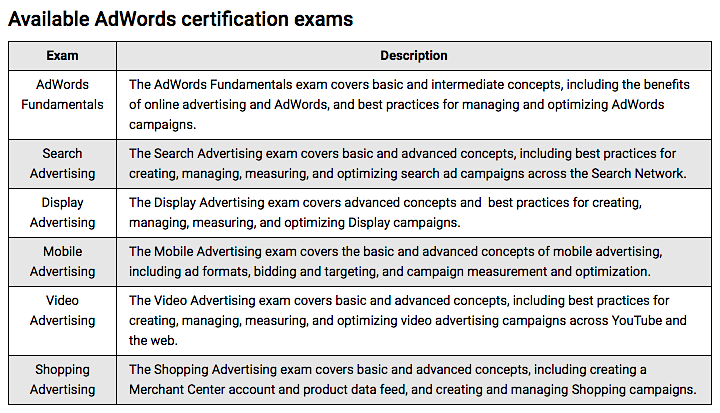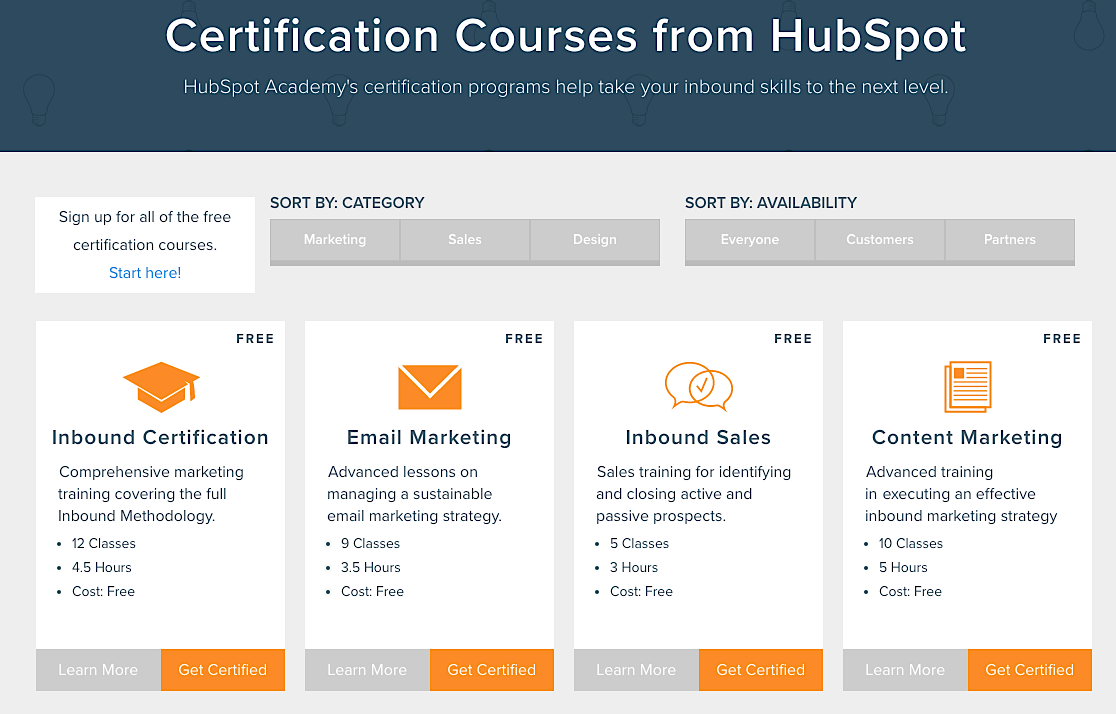Should you get a marketing certification? Are they worth it? Here are my thoughts.
First off, most marketing certifications are essentially multiple-choice question courses with exams. So all you have to do is study and fill out some responses and you’re certified. You can be AdWords certified, Google Analytics certified, SEO certified, etc.
Do Certifications Make You a Better Marketer?
Just because you’re certified doesn’t mean you’ve learned anything. You’ve gotten good at memorizing answers—and understanding theory—but that means very little in practice.
If you don’t have real, practical experience on a website, you can have all the certifications in the world, but that doesn’t mean you’ll do well. A piece of paper saying you’re certified doesn’t mean much in the real world.
Certifications don’t really mean anything at all. They don’t move the needle. They might give you some superficial knowledge of marketing theory and the right vernacular, but marketing changes so much year to year that your certification may not mean much by the next year.
Personally, I’d rather work with someone who’s actually done campaigns and worked on live sites than someone who just has a ton of certifications.
Learn More: Best Way to Learn Internet Marketing
Google AdWords Experts
One of Neil’s team members is certified as a Google AdWords expert, but he sucks so badly at AdWords that Neil would not have him touch my campaigns with a 10-foot pole. Guess what kind of certification Neil has with Google AdWords? None. It comes down to experience.
When I first took over Single Grain, I was trying to revamp a lot of things. We really didn’t have any processes in place so my goal was to make sure everybody was on the same page and thus we tried to run people through certifications. We had people do the HubSpot certification, we had people get Google AdWords certified—everybody got certified.

They got certified pretty quickly, and I thought, “Wow, we’re good to go now. We’re golden, right?” Nothing could have been further from the truth.
Related Content: How to Set Up Call Tracking in Google AdWords
What to Do Instead of Getting Certified
If you’re looking to really get started, you’re probably better off learning on your own and actually executing real marketing campaigns and experiments.
That’s not to say that HubSpot and Moz are completely worthless. I think their free certifications are still a good knowledge source. But like I said, you’re basically just memorizing answers to a test; it’s not really impressive at all. You actually have to bring real-world skills to the table.

Getting a certification from a for-profit college or getting a master’s degree in digital marketing is not going to help much either because you’re not getting the real-world experience you need.
If you want to learn how to get that real-world experience, a good starting point is one of our older posts where we talk about how to learning marketing.
A Good Degree ≠ a Good Marketer
I have a buddy who loves hiring people from Stanford. These are really smart kids, but they’re book-smart. Right now, he’s trying to teach them how to grow a business through marketing in order to generate sales. These guys run everything like a textbook, just as if they’re getting certified or taking a test. They’re following all the rules, but they’re generating zero sales.
I told them how they could generate sales through webinars. You know what they said? “Oh, cool. Like, how do we do it? What’s the format? Oh yeah, we’ll check it out.”
Then I told them to find potential customers at tech conferences. Their response? “Oh, how do we find out which conferences we should go to?”

Just because someone has a certification or a great college degree, that doesn’t mean they’re qualified for the job or that they can actually get you results.
If you want to get certified, by all means go and do it. It could be great to add to your resume—but it won’t do anything for your business.
How I Got My “Marketing Certification”
Let me tell you how I got my internet marketing certification. This is when I was working a dead-end job after graduating from a public school in San Diego. I was basically twiddling my thumbs when my friend said, “Hey, you might want to look into this internet marketing thing.”
That’s when I actually started. I picked up this unpaid internship while I had a full-time job. I’d basically get home from work at about 2-3 p.m. in the afternoon. Then I’d go into my internship and from about 3 p.m. to 12 a.m. I did my “marketing certification.” I was studying on my own and doing experiments all the time. Thankfully, at this internship they gave me my own domain and blog to experiment on.
Since I was working for free, I was also learning from all these other interns and picking up combined experience. To this day I’m still friends with some of those people, and many have become successful marketers in their own right.
Ultimately, this internship experience helped me get my first real paid marketing job (where I was getting paid much more than at my original job).
A lot of people look down on unpaid internships, but they give you real-world experience that certifications just can’t. So, even though you’re not getting paid, you could argue that it’s a lot more worthwhile than having a degree that you pay tens of thousands of dollars for which doesn’t guarantee you a job at all.
How to Find Real-World Marketing Experience
If you can’t find an internship, you can always just reach out to somebody in the marketing space that you really respect. Reach out to them, offer to do work for free, and then come up with some ideas for them. They’re going to really respect you for that.
Don’t be like those Stanford students who needed constant hand-holding. Employers want people who can think for themselves, and those are the people who will come up with creative ideas, because that’s what marketing is at the end of the day.
You have to be very creative, and you have to be able to learn from failure. Chances are that for every 10 ideas you have, only one is really going to be a home run and the other nine are going to suck. But you have to go through different experiences to realize what it takes to be a great marketer.
Don’t Suck at Marketing
One time Neil had an accredited university approach him and say, “Hey, Neil, we want to do a Neil Patel marketing certification with you.” The projections were seven figures of pure profit for Neil in year one, and even more in year two and beyond. He wouldn’t have to do much on his end other than help create the curriculum and go into a few classrooms and make sure the process was right.
You know what Neil told them? “No thanks. I don’t want a bunch of people running around saying they’re Neil Patel certified when they suck at marketing.”
This post was adapted from Marketing School, a 10-minute daily podcast in which Neil Patel and Eric Siu teach you real-life marketing strategies and tactics from their own experience to help you find success in any marketing capacity. Listen to the podcast version of this post below:






